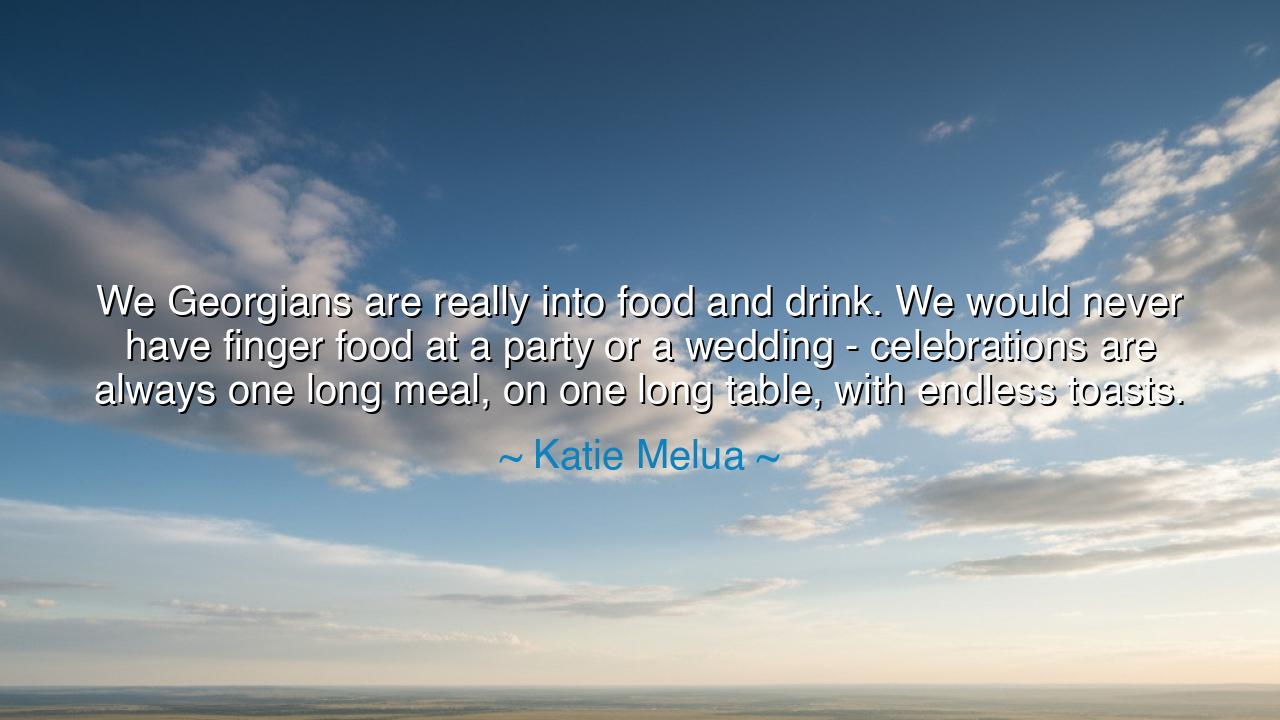
We Georgians are really into food and drink. We would never have
We Georgians are really into food and drink. We would never have finger food at a party or a wedding - celebrations are always one long meal, on one long table, with endless toasts.






The words of Katie Melua—“We Georgians are really into food and drink. We would never have finger food at a party or a wedding—celebrations are always one long meal, on one long table, with endless toasts.”—speak of the ancient soul of a people. Here, the table is not mere wood, nor the meal mere nourishment; it is the altar of fellowship, the sacred space where joy is shared and bonds are forged. The Georgian heart, as revealed in her words, understands that true celebration is not in fragments or haste, but in the unbroken flow of communion.
The long table is a symbol of equality and unity. There, no one is apart, and no hand is left untaken. To sit together, to break bread and pour wine, is to affirm that every soul present belongs to the greater whole. It is a defiance of loneliness, a declaration that in life’s greatest moments—weddings and feasts—man must not dwell in isolation, but in harmony. The “endless toasts” are more than ritual; they are words of blessing, of memory, of honor that lift the spirit higher than food alone could satisfy.
This tradition finds its echo in the ancient Greek symposium, where philosophers, poets, and warriors reclined together, drinking wine not merely to quench thirst but to summon wisdom, poetry, and friendship. At such gatherings, as in Georgia’s feasts, the meal was not the end but the means—the vessel through which truth, laughter, and remembrance were poured out like sacred libations. The greatness of a people can often be measured by the way they gather at the table.
The rejection of finger food is symbolic, too. For such food suggests haste, a passing of sustenance without ceremony. But the Georgian feast rejects speed, insisting instead upon slowness, depth, and continuity. It teaches that life’s highest joys cannot be tasted in fragments—they must be dwelt in, savored, shared without end, until time itself bends to the rhythm of fellowship.
Therefore, O listener, let this wisdom be yours: the meal is not merely to feed the body, but to bind souls. Whether you sit at a humble table or at a banquet stretching into eternity, remember that food and drink, when shared, become more than fleshly sustenance—they become symbols of love, unity, and life itself. As Katie Melua reminds us, let your celebrations be long, your tables filled, and your toasts endless, for in such moments, humanity draws closest to the divine.






TNPham Thi Thanh Nga
It’s clear that food and drink play a major role in Georgian celebrations, creating a sense of unity and enjoyment. The idea of endless toasts and one long meal sounds like an immersive experience. Do you think that modern events, which often focus on convenience and speed, miss out on this kind of communal experience? How important is the atmosphere of a celebration for you?
NTThao Nguyen Thi
Katie Melua’s perspective on Georgian celebrations makes me think about how food can serve as a centerpiece of cultural identity. It’s fascinating how food is so intertwined with the essence of social gatherings in Georgia. How do you think different cultures use food to define their celebrations? Do you think the formality of these traditions, like the long meals, adds to the joy of the event?
MLBui Mai Lan
I love the imagery of a long table and endless toasts at Georgian celebrations. It sounds so warm and inviting, where everyone is fully immersed in the experience. I wonder, do you think this kind of tradition is becoming less common in today’s fast-paced world? Would you prefer this kind of celebration, or do you lean more toward modern, simpler parties with less focus on food?
QQquangcao quynhanh
Katie Melua’s description of Georgian celebrations really highlights the cultural importance of food and drink in their social life. It sounds like a true celebration of togetherness, where the focus is on community and enjoying the moment. Do you think the way food is integrated into celebrations reflects a deeper sense of cultural identity? How do you feel about the role food plays in creating memorable events?